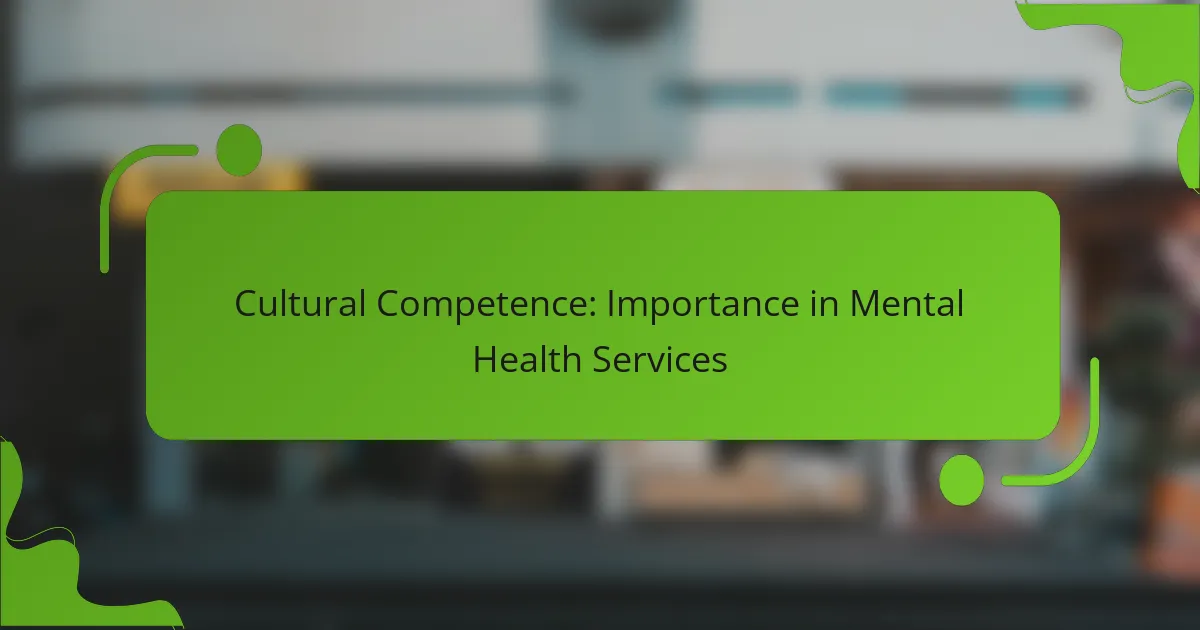Kulttuurinen kompetenssi on keskeinen osa mielenterveyspalveluja Suomessa, sillä se edistää ymmärrystä ja kunnioitusta erilaisia taustoja kohtaan, mikä voi merkittävästi parantaa terapeuttista suhdetta. Kulttuuristen erojen tunnistaminen ja integroiminen mahdollistaa mielenterveyden ammattilaisille tehokkaamman ja henkilökohtaisemman hoidon tarjoamisen asiakkailleen.
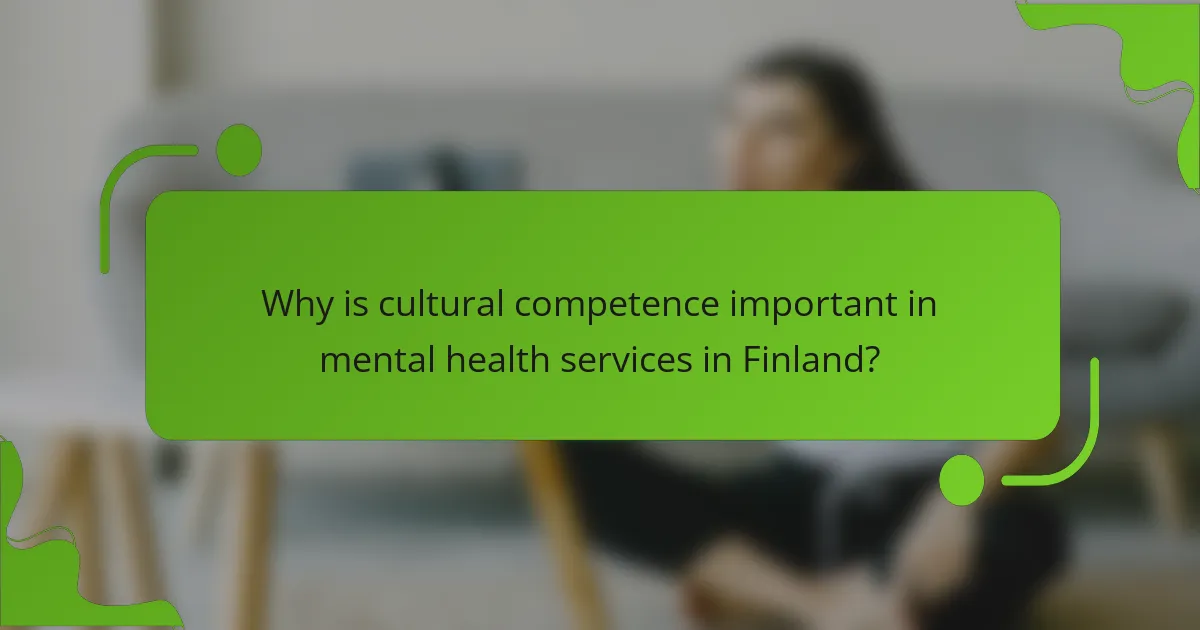
Why is cultural competence important in mental health services in Finland?
Cultural competence is crucial in mental health services in Finland as it fosters understanding and respect for diverse backgrounds, which can significantly enhance the therapeutic relationship. By recognizing and integrating cultural differences, mental health professionals can provide more effective and personalized care to their clients.
Enhances patient trust
When mental health providers demonstrate cultural competence, patients feel more understood and respected, which builds trust. This trust is essential for effective communication and encourages patients to share their experiences openly, leading to better assessment and treatment.
For example, a therapist who acknowledges a patient’s cultural background and incorporates relevant practices into therapy can create a more welcoming environment. This approach can lead to increased patient satisfaction and a stronger commitment to the treatment process.
Improves treatment outcomes
Culturally competent care can lead to improved treatment outcomes by tailoring interventions to fit the cultural context of the patient. This personalization can enhance engagement and adherence to treatment plans, ultimately resulting in better mental health results.
In Finland, integrating culturally relevant practices, such as traditional healing methods alongside modern therapies, can be particularly effective for certain populations. This holistic approach can address both psychological and cultural needs, leading to more sustainable recovery.
Reduces health disparities
Cultural competence helps reduce health disparities by ensuring that all patients receive equitable care, regardless of their background. By understanding the unique challenges faced by different cultural groups, mental health services can address barriers that may prevent access to care.
In Finland, this might involve providing language support or culturally sensitive resources to immigrant populations. By actively working to eliminate these disparities, mental health services can promote better overall community health and well-being.

How can mental health professionals develop cultural competence?
Mental health professionals can develop cultural competence through targeted training, community engagement, and self-reflection practices. These approaches enhance understanding and responsiveness to diverse cultural backgrounds, ultimately improving client care.
Training programs
Training programs focused on cultural competence provide mental health professionals with essential knowledge and skills. These programs often include workshops, seminars, and online courses that cover cultural awareness, communication styles, and the impact of cultural factors on mental health.
Professionals should seek programs that are accredited and recognized within their field, ensuring they meet industry standards. Participating in ongoing education helps maintain and update cultural competence as societal norms evolve.
Community engagement
Engaging with local communities allows mental health professionals to gain insights into the cultural contexts of their clients. This can involve attending community events, collaborating with local organizations, or conducting outreach programs tailored to specific cultural groups.
Building relationships with community leaders can facilitate trust and open lines of communication, making it easier for clients to seek help. Understanding community dynamics and values is crucial for providing effective mental health services.
Self-reflection practices
Self-reflection practices encourage mental health professionals to examine their own cultural biases and assumptions. Regularly assessing personal beliefs and attitudes can help identify areas for growth and improvement in cultural competence.
Journaling, peer discussions, and supervision can be effective methods for self-reflection. Professionals should consider seeking feedback from clients about their experiences, which can provide valuable insights into their cultural responsiveness.
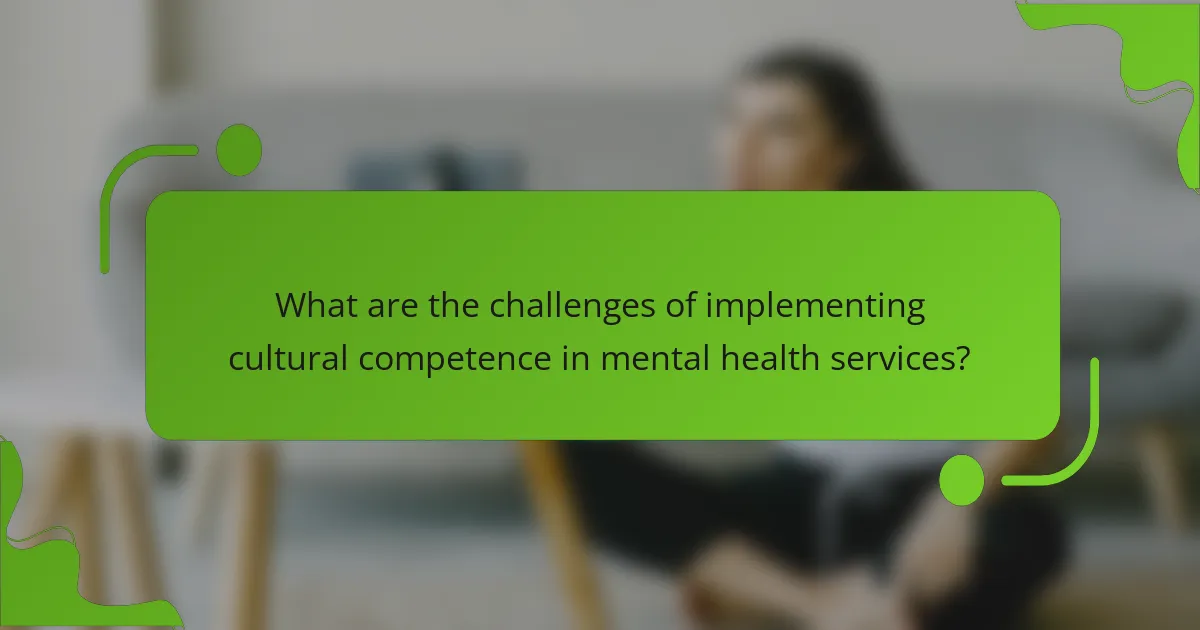
What are the challenges of implementing cultural competence in mental health services?
Implementing cultural competence in mental health services faces several significant challenges, including a lack of resources, resistance to change, and insufficient training. These obstacles can hinder the effectiveness of mental health care for diverse populations, affecting overall service delivery and patient outcomes.
Lack of resources
A major challenge in achieving cultural competence is the lack of financial and human resources. Many mental health organizations operate under tight budgets, which limits their ability to hire culturally diverse staff or provide necessary training. This resource scarcity can lead to inadequate support for culturally specific programs.
Additionally, insufficient funding may restrict access to materials and tools that facilitate cultural understanding, such as translation services or culturally relevant therapeutic resources. Organizations must prioritize resource allocation to address these gaps effectively.
Resistance to change
Resistance to change is another significant barrier to implementing cultural competence in mental health services. Staff may be hesitant to adopt new practices or modify existing ones due to comfort with the status quo or fear of the unknown. This reluctance can stem from a lack of understanding of the benefits of cultural competence.
To overcome this resistance, mental health organizations should foster an inclusive culture that emphasizes the importance of diversity and the positive impact of culturally competent care. Engaging staff in discussions and providing evidence of successful outcomes can help mitigate resistance.
Insufficient training
Insufficient training in cultural competence is a critical issue that affects mental health professionals’ ability to provide effective care. Many practitioners may not receive adequate education on cultural differences, leading to misunderstandings and ineffective treatment approaches. This gap in training can result in a lack of trust between providers and clients from diverse backgrounds.
To address this challenge, organizations should implement ongoing training programs that focus on cultural awareness, sensitivity, and specific strategies for engaging with diverse populations. Regular workshops and training sessions can help ensure that staff remain informed and capable of delivering culturally competent care.
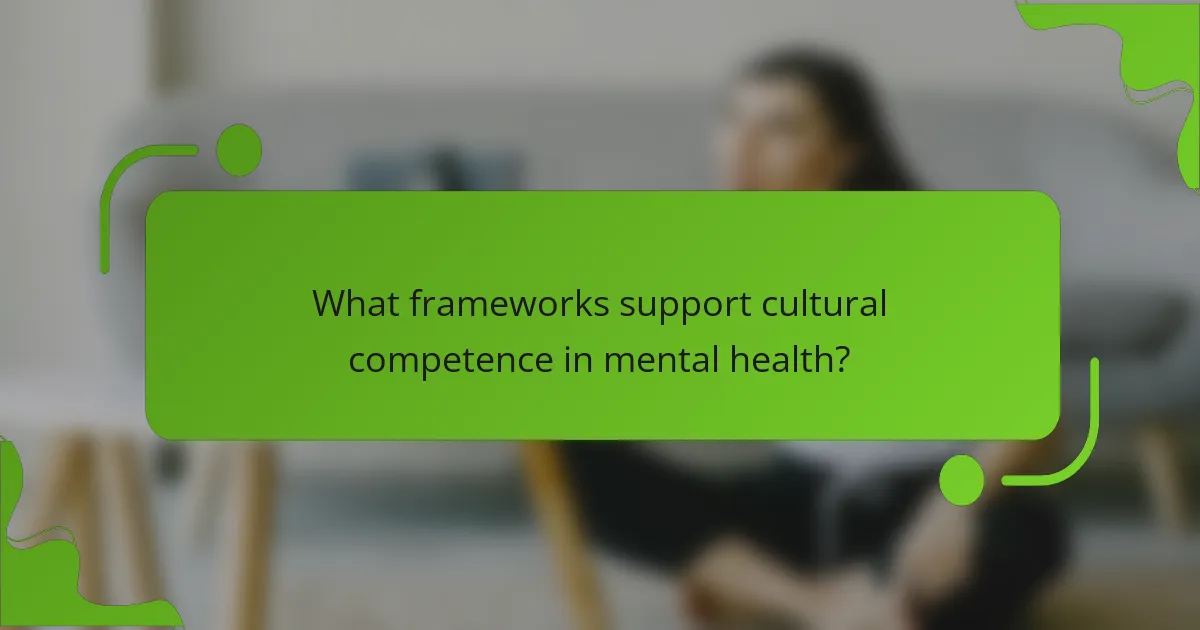
What frameworks support cultural competence in mental health?
Frameworks that support cultural competence in mental health services include national guidelines and community-based models. These frameworks help ensure that mental health care is sensitive to the diverse cultural backgrounds of clients, promoting effective communication and understanding.
National guidelines
National guidelines for cultural competence in mental health often provide a structured approach for practitioners. They typically emphasize the need for training in cultural awareness, understanding social determinants of health, and integrating cultural practices into treatment plans.
For instance, in Finland, the National Institute for Health and Welfare (THL) has developed guidelines that encourage mental health professionals to consider cultural factors in their assessments and interventions. These guidelines aim to improve service delivery and outcomes for diverse populations.
Community-based models
Community-based models of cultural competence focus on engaging local populations in the design and delivery of mental health services. These models prioritize collaboration with community leaders and organizations to ensure that services are culturally relevant and accessible.
For example, mental health initiatives in Finland often involve partnerships with immigrant organizations to tailor services that address specific cultural needs. This approach not only enhances trust but also improves the effectiveness of mental health interventions.
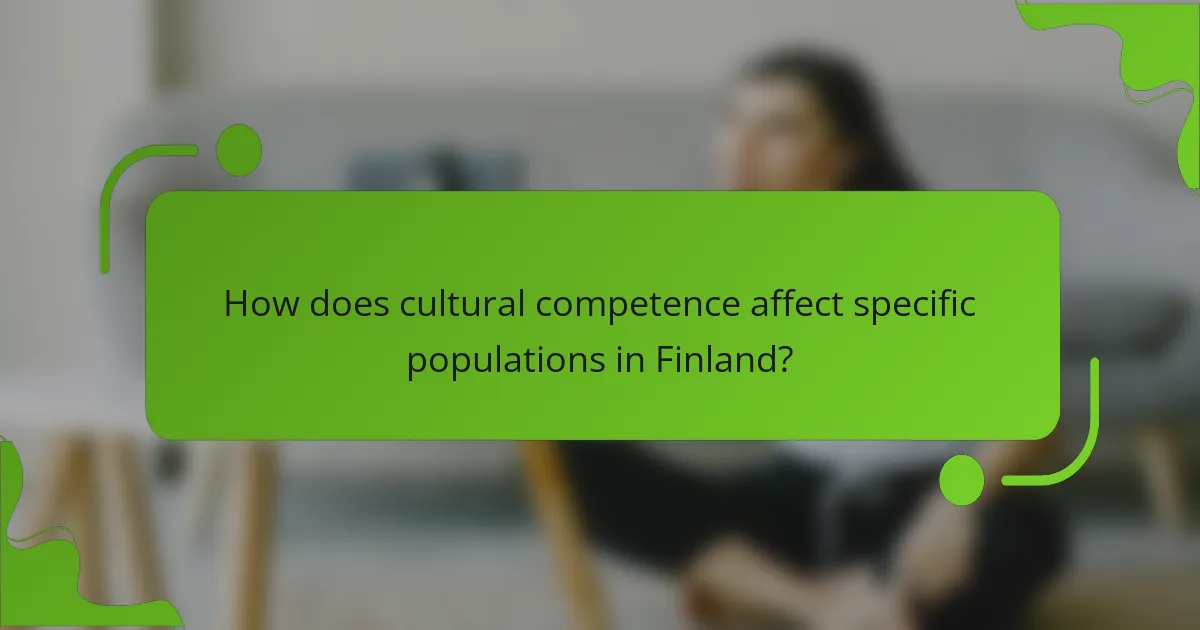
How does cultural competence affect specific populations in Finland?
Cultural competence significantly impacts specific populations in Finland by enhancing the effectiveness of mental health services. It fosters understanding and respect for diverse cultural backgrounds, leading to better communication and more tailored support for individuals from various communities.
Impact on immigrant mental health
Immigrants in Finland often face unique mental health challenges, including isolation and cultural dislocation. Culturally competent mental health services can help bridge these gaps by providing support that acknowledges and respects their cultural identities.
For example, mental health professionals trained in cultural competence can use language services and culturally relevant therapeutic approaches, which can improve trust and engagement. This tailored support can lead to better outcomes, as immigrants feel more understood and valued in their care.
Support for indigenous communities
Indigenous communities in Finland, such as the Sámi, experience distinct mental health issues rooted in historical trauma and cultural loss. Culturally competent services are crucial in addressing these issues by integrating traditional practices and perspectives into mental health care.
Practitioners should actively involve indigenous voices in the development of mental health programs, ensuring that services are not only accessible but also resonate with cultural values. This approach can empower communities and promote healing through culturally affirming practices.

What role do mental health organizations play in promoting cultural competence?
Mental health organizations are crucial in fostering cultural competence by developing policies, allocating resources, and providing training that respects and integrates diverse cultural perspectives. This ensures that mental health services are accessible and effective for individuals from various backgrounds.
Policy development
Policy development is essential for mental health organizations to establish frameworks that promote cultural competence. These policies should address the unique needs of diverse populations, ensuring that services are tailored to various cultural contexts.
Organizations can implement guidelines that require cultural assessments during patient evaluations, helping to identify specific cultural factors that may influence mental health treatment. This approach not only enhances service delivery but also fosters trust between providers and clients.
Resource allocation
Effective resource allocation is vital for supporting cultural competence initiatives within mental health organizations. This includes funding for training programs that educate staff on cultural sensitivity and the importance of understanding different cultural backgrounds.
Additionally, organizations should invest in materials and tools that reflect the cultural diversity of their client base, such as translated resources or culturally relevant therapeutic practices. Ensuring that resources are appropriately distributed can significantly improve the quality of care provided to diverse populations.
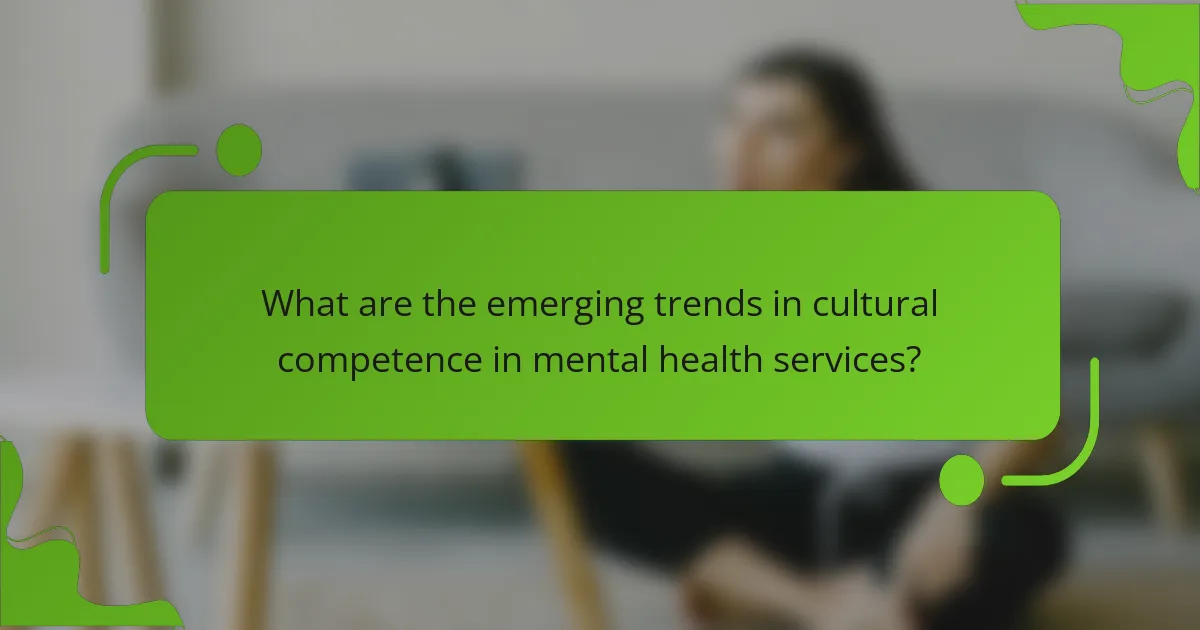
What are the emerging trends in cultural competence in mental health services?
Emerging trends in cultural competence within mental health services focus on enhancing the understanding and responsiveness of providers to diverse cultural backgrounds. This involves integrating new technologies and emphasizing intersectionality to better address the unique needs of various populations.
Integration of technology
The integration of technology in mental health services is transforming how cultural competence is approached. Digital platforms can facilitate access to culturally relevant resources and training for mental health professionals, enabling them to better understand the cultural contexts of their clients.
For instance, telehealth services can provide support to individuals in remote areas, ensuring they receive culturally sensitive care without the barriers of distance. Additionally, data analytics can help identify trends in mental health issues across different cultural groups, allowing for more tailored interventions.
Focus on intersectionality
Focusing on intersectionality means recognizing how various social identities—such as race, gender, and socioeconomic status—interact and influence mental health outcomes. This approach encourages mental health providers to consider the complex realities of their clients’ lives rather than viewing cultural background in isolation.
Practically, this can involve training programs that educate providers on the nuances of intersectionality, helping them to develop more effective communication and treatment strategies. For example, a provider might consider how a client’s cultural background and gender identity impact their mental health experience, leading to more personalized and effective care.
